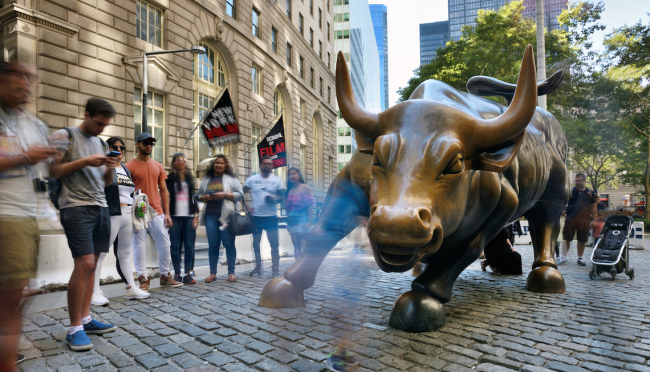
- 02 Oct 2019
- Working Paper Summaries
The Value Potential of New Business Models
A business model determines the opportunity’s value creation potential and suggests how the resulting value might be distributed among participants pursuing that model. Strategists need to understand the interaction of elements of the job to be done and asset configuration in order to create differing strategic prescriptions.
- 02 Oct 2019
- What Do You Think?
What Grade Would You Give Walmart CEO Doug McMillon?
SUMMING UP: James Heskett's readers gave Walmart high marks for its response to gun violence but suggested the company could have been even more proactive. Open for comment; 0 Comments.

- 10 Jan 2019
- Cold Call Podcast
Can Miguel McKelvey Build the ‘Culture Operating System’ at WeWork?
How deeply does the culture of a startup matter? Can it be shaped? Professor Jeffrey Rayport discusses WeWork cofounder Miguel McKelvey’s innovative role in building a company culture to support rapid growth. Open for comment; 0 Comments.

- 03 Dec 2018
- Research & Ideas
How Companies Can Increase Market Rewards for Sustainability Efforts
There is a connection between public sentiment about a company and how the market rewards its corporate social performance, according to George Serafeim. Is your company undervalued? Open for comment; 0 Comments.

- 02 May 2017
- Working Paper Summaries
The Cross Section of Bank Value
How do commercial banks create value? This paper represents the first attempt to empirically identify the primary determinants of cross-sectional variation in bank value. Among the findings: A bank's ability to produce deposits is by far the most important determinant in explaining cross-sectional variation in bank value.
- 10 Sep 2012
- HBS Case
HBS Cases: Branding Yoga
As yoga's popularity has grown into a $6 billion business, a cast of successful entrepreneurs has emerged with their own styles of the ancient practice. Yet yoga's rise underscores a larger question for Professor Rohit Deshpandé: Is everything brandable? Closed for comment; 0 Comments.

- 13 Apr 2011
- Working Paper Summaries
The ‘IKEA Effect’: When Labor Leads to Love
Companies increasingly involve customers in the design and assembly of products, from Converse allowing customers to design their own shoes to IKEA asking customers to assemble their own furniture. In this paper researchers Michael I. Norton (Harvard Business School), Daniel Mochon (University of California at San Diego), and Dan Ariely (Duke) use the "IKEA Effect" to explain the increase in valuation we place on products we build ourselves. The researchers discuss the implications of the IKEA Effect for marketing managers and organizations more generally. Key concepts include: Successful assembly of products—no matter how amateurish—leads consumers to value them over and above the value that arises from merely purchasing a product. Labor increases valuation of completed products not just for consumers who profess an interest in "do-it-yourself" projects, but even for those who express a preference for buying preassembled products. Successful completion is an essential component for the link between labor and liking to emerge; participants who were not permitted to finish their creations did not show an increase in willingness-to-pay. The marketing challenge lies in convincing consumers to engage in the kinds of labor that will lead them to value products more highly, especially given their general aversion to such pursuits. The overvaluation that occurs as a result of the IKEA Effect has implications for organizations as a contributor to two key organizational pitfalls: sunk cost effects and the "not invented here" syndrome. Closed for comment; 0 Comments.

- 24 Nov 2009
- Working Paper Summaries
From Strategy to Business Models and to Tactics
Drivers such as globalization, deregulation, or technological change, just to mention a few, are profoundly changing the competitive game. Scholars and practitioners agree that the fastest-growing firms in this new environment appear to have taken advantage of these structural changes to compete "differently" and innovate in their business models. However, there is not yet agreement on what are the distinctive features of superior business models. This dispute may have arisen, in part, because of a lack of a clear distinction between the notions of strategy, business model, and tactics. HBS professor Ramon Casadesus-Masanell and Joan Enric Ricart present an integrative framework to distinguish and relate the concepts of business model, strategy, and tactics. Key concepts include: An integrative framework that cleanly separates the realm of business model, strategy, and tactics will help guide the search for novel, interesting, and profitable new ways to compete. "Business model" refers to the logic of the firm, the way it operates, and how it creates value for its stakeholders. "Strategy" refers to the choice of business model through which the firm will compete in the marketplace. "Tactics" refers to the residual choices open to a firm by virtue of the business model that it employs. Closed for comment; 0 Comments.

How to Bring Good Ideas to Life: The Paul English Story
Paul English is one of the most imaginative and successful innovators of his generation. He cofounded several companies, including Kayak, before starting Boston Venture Studio, where he is currently a partner. This multimedia case, “Bringing Ideas to Life: The Story of Paul English,” explores his process of creative idea generation, examining how he was able to bring so many ideas to market. In this episode, Harvard Business School professor Frances Frei and English discuss how to tell the difference between a good idea and a bad one, the importance of iteration, and taking a systematic (but fast) approach to developing new ideas. They also explore how his process dovetails with Frei’s “move fast and fix things,” strategy from her recent book.